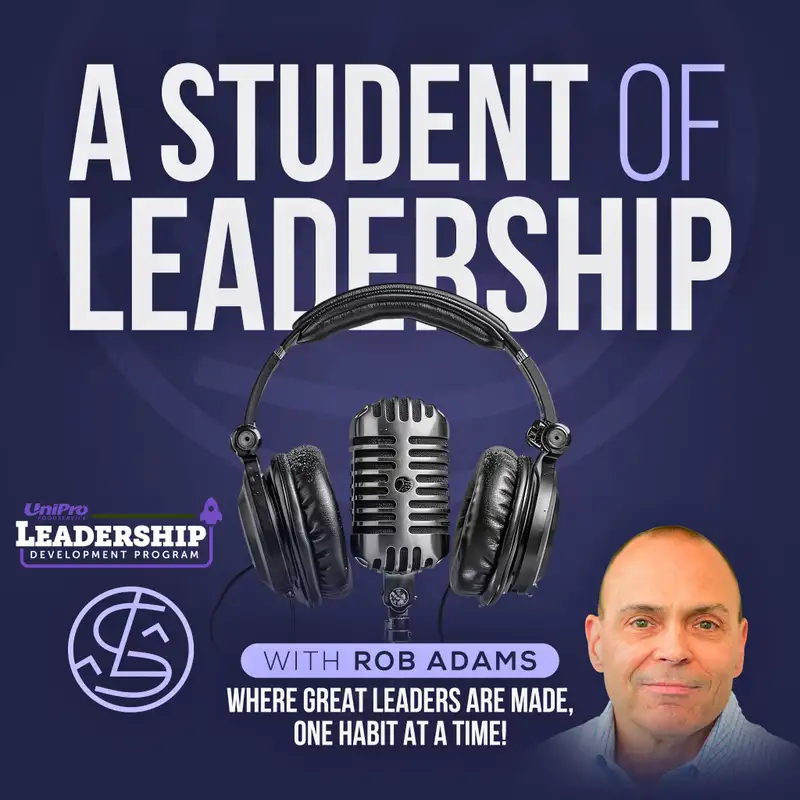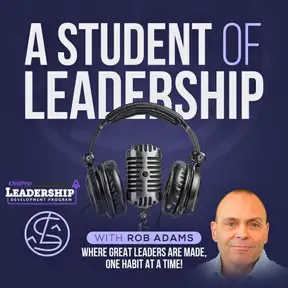Episode 20 - Leadership Prioritization
Download MP3Welcome to a student of leadership, a micro podcast where leaders are made one habit at a time. Hosted by Rob Adams, a leadership veteran with thirty years of experience. This podcast explores key concepts that define exceptional leadership. Each episode delves into a powerful word or strategy, offering practical insights real world stories. Whether you're just starting out or an experienced executive, join Rob as he guides you in learning, growing, and leading with purpose.
Rob Adams:Hello everyone and welcome back to A Student of Leadership Micro Podcast. I cannot believe we've hit our twentieth micro episode and it is an exciting journey that we're on as we learn that leadership word and how it impacts the way you on your own journey are developing your skills to help your team make them better. This is where great leaders are made one habit at a time. And yes, I am Rob Adams and I am your host today and we are exploring the next leadership area. It's about leadership capability that separates exceptional leaders from merely busy ones.
Rob Adams:It's about prioritization. In today's world of endless demands and constant connectivity, the ability to prioritize effectively isn't just a productivity hack, it's a survival skill. True prioritization goes beyond making to do lists or managing time. It's about making conscious choices that align your finite resources, time and energy along with attention with what truly matters. It's the art of saying no to good opportunities so you can say yes to great ones.
Rob Adams:In this micro episode we will uncover the science and strategy of masterful prioritization, share a powerful story of transformation through focused leadership, and provide practical frameworks to help you choose where to invest your leadership capital. Consider Warren Buffett's revolutionary approach to prioritization exemplified in his famous twenty five five rule and how he's applied it throughout his career. In the late 1960s, when many investors were riding the technology boom, Buffett made a controversial decision. He completely avoided tech stocks, saying they fell outside his circle of competence. This wasn't just about avoiding risk, it was about a profound prioritization.
Rob Adams:Buffett recognized that success comes from not from trying to do everything well but from focusing intensely on what you understand best. He demonstrated this principle again in February when he largely avoided the .com bubble saving Berkshire Hathaway from the massive losses that followed. But perhaps the most telling is how Buffett prioritizes his own time. Despite his immense wealth and influence he spends 80% of his day reading and thinking. When asked about this unusual allocation, he explained, That's what I do.
Rob Adams:I think and I read and I make very few decisions. This radical prioritization of deep thinking over constant action has been key to his sustained success over the decades. Stephen Covey's observation that the key is in not spending time but investing it takes on a deeper meaning when we consider its practical implications. Just as financial investors must choose carefully where to place their capital, leaders must equally strategic about where they invest their time and energy. The returns on these investments in terms of impact, growth, and results depend entirely on the wisdom of these choices.
Rob Adams:Now let's get into some reflection questions. What percentage of your time is spent on truly strategic priorities versus reactive tasks? How do you distinguish between urgent demands and important priorities? And what would become possible if you eliminated the bottom 80% of your current activities? A 2023 McKinsey study titled The Focused Leader revealed that executives who excel at prioritization achieve 2.3 times better performance outcomes and report 40% lower stress levels.
Rob Adams:More surprisingly, their team showed 50% higher engagement rates suggesting that clear prioritization at the top creates clarity and purpose throughout the entire organization. Now here are some practical tips and an action challenge. Here are three transformative strategies for mastering prioritization. Number one, create priority filters. Develop clear criteria for evaluating opportunities and demands.
Rob Adams:Every potential commitment should pass through these filters. Does it align with our core strategy? Will it create disproportionate value? Is this the best use of our resources right now? Number two: Institute priority rhythms.
Rob Adams:Establish regular times for reviewing and resetting priorities. Your daily tasks, your weekly projects, your monthly four strategies and quarterly four goals. Think about monthly strategies, about quarterly goals. This creates a natural cadence for maintaining a focus on what matters. And number three, build priority boundaries.
Rob Adams:Create systems that protect your high priority activities. This might include deep work blocks on your calendar, delegation protocols for your routine decisions, or regular priority alignment meetings with your team. Remember effective prioritization isn't about doing more things right, it's about doing more right things. Now your action challenge for this week is yes conduct a priority audit of your last two weeks. Document where your time went.
Rob Adams:Categorize activities by strategic value and identify your top three time wasters. Create a specific plan to eliminate, delegate, or redesign these activities. Choose one significant change to implement this week and track the impact on your effectiveness. You see prioritization is more than a time management skill. It's a strategic imperative that determines your impact as a leader.
Rob Adams:As you work on this week's action challenge remember that every yes has an opportunity cost and every no creates space for something more important. Next week we'll explore reflection, the powerful practice that turns experience into wisdom and helps leaders make better decisions through thoughtful analysis of their actions and their outcomes. Until then, keep practicing the habits that make great leaders and remember, great leaders are made one habit at a time. See you next time on A Student of Leadership. Take care everybody.
Otro:Thanks for tuning in to this episode of the student of leadership. Leadership is about who we become and how we help others grow. If you found value in this podcast, share it with a fellow leader and connect with Rob on LinkedIn or leave a review. New episodes drop weekly, so don't forget to subscribe to stay connected. Until next time, keep learning, growing, and leading with intention.
Otro:Remember, great leaders are made one habit at a time. See you next time on a student of leadership.

